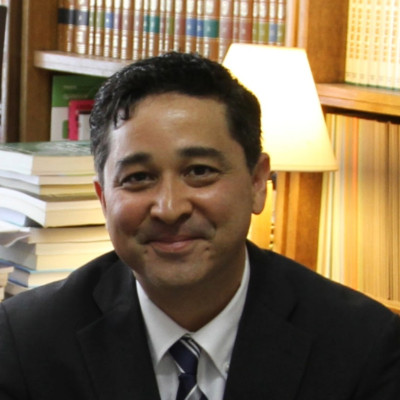Sessions / Location Name: Room E411
Location not set by organizers
Location:
Building: Lecture Hall Building < Tokyo University of Science, Katsushika Campus
Doing DDL Right: Principles and Practical Tips for the Classic Use of Corpora in the Language Classroom #4274
The original, classic conception of data-driven learning (“DDL”), learners’ use of corpora to access exemplars of words or constructions, has been convincingly shown to be effective, but remains relatively uncommon in classrooms. Recent research shows a shift towards teacher training in corpora and DDL, a trend with the potential to stimulate wider adoption and move DDL closer to mainstream status among practitioners. The project presented on endeavours to support the effort to make DDL more practical for teachers by examining effective and transparent implementations of it and identifying underlying principles contributing to success. Using a systematic literature search and thematic analysis, the project investigates the research questions: (1) what are the characteristics of DDL implementations reported as successful in primary studies, (2) what aspects of the implementations can their success be attributed to, and what aspects can be observed to be disadvantageous, and (3) what other themes emerge from the analysis? Based on analysis of major themes, some core characteristics of DDL and factors impacting its success are proposed. Finally, connecting these principles to practice will be supported and encouraged by reviewing tools and activities for implementing DDL confidently, efficiently and with minimal upfront effort.
Good Respondents But Poor Inquirers? Comparing Human-initiated and GenAI-generated Questions in Taiwan EMI Classrooms #4332
Accountable Talk can promote verbal exchanges and facilitate EMI classroom interaction. AT is an instructional strategy encouraging productive classroom discourse and student engagement. Consequently, 38 EMI learners enrolled in an EMI course were obligated to generate questions with and without GenAI assistance to engage in meaningful discussions with their peers based on the content knowledge they learnt. The discoursal functions of each verbal interaction were categorised by recording and transcribing it: commenting, expressing an opinion, making a prediction, clarifying something, posing a question, soliciting a response, making a connection, or acknowledging other people's ideas. The findings reveal that self-initiated questions elicited deeper peer discussions than those generated by GenAI, although both methods encouraged opinion articulation and commentary. While students viewed AT activities positively, they expressed reservations about GenAI’s ability to generate meaningful and contextually appropriate questions. Despite these concerns, AT activities significantly enhanced learners’ motivation and confidence in peer verbal exchanges. These results suggest that while GenAI can assist in content-based learning by providing answers, it falls short in fostering the dynamic inquiry processes essential to effective classroom discourse. The study underscores the enduring importance of learner agency in leveraging AT strategies, even in contexts augmented by advanced AI tools.
Heterotopias in CALL: Virtual Spaces for Transformative Learning #4318
This presentation explores the concept of heterotopias within computer-assisted language learning (CALL), specifically examining how virtual exchange platforms enable Japanese university students studying English as a Foreign Language (EFL) to engage in distinctive learning experiences. Drawing upon Michel Foucault’s framework of heterotopias, spaces distinguished from traditional educational contexts, the study investigates how virtual exchanges influence students' perceptions of language use and their learner identity.
Employing Q methodology, a mixed-methods research approach designed to systematically identify shared viewpoints, data was collected by asking Japanese university students participating in virtual exchanges to rank statements reflective of their experiences. Statistical analysis of the data revealed distinct learner perspectives and shifts in learner identity shaped through virtual exchange experiences.
Findings indicate that these virtual exchanges function effectively as heterotopias, fostering authentic communication, intercultural interaction, and active learner engagement beyond conventional classroom limitations. The presentation emphasizes the pedagogical potential of virtual exchanges for reshaping language education, highlighting their role in facilitating meaningful interactions and enhancing learner agency. Attendees will gain insights into innovative CALL practices that support genuine language use within intercultural educational contexts.
The Impact of Collaborative Inter-Group Peer Feedback on Web-based Collaborative L2 Writing #4236
Web-based collaborative L2 writing promotes writing to learn and language learning by encouraging learners to exchange feedback and make decisions collaboratively (Zhang & Chen, 2022). However, learners may disregard feedback or disengage due to doubts about their language skills, peer feedback quality, or group dynamics, which limits learning outcomes (Hsu, 2019; Neumann & McDonough, 2015). Enhancing learners' engagement with peer feedback is crucial. This study explores the impact of collaborative inter-group peer feedback (CPF) on web-based L2 collaborative writing, focusing on feedback quality, co-written essays, and individual L2 writing improvement.
Participants included 42 EFL learners from two junior writing classes in a Taiwanese university. The classes were randomly divided into a CPF group and a non-CPF (NCPF) group. Over seven weeks, both groups completed pre- and post-test individual writing and two collaborative writing tasks using Google Docs. The CPF group exchanged collaboratively discussed feedback with another group during collaborative writing processes, while the NCPF group did not. Analyses evaluated the content, organization, and language accuracy of pre- and post-tests and co-written essays. Peer feedback was coded for focus (content, organization, language) and quality (critical vs. non-critical). Results aimed to shed light on CPF quality and its impact on the co-written essays and individual L2 writing development.
Leveraging Cloud-Based Peer Assessment to Enhance Participation in Oral Presentations #4322
This presentation explores integrating student peer evaluation into participation scores for oral presentations using Google Workspace tools, addressing the critique that students often disengage after presenting. Building on years of classroom experience, we will demonstrate how Google Workspace applications (e.g., Forms, Sheets) can collect and quantify peer feedback, incorporating it into a transparent grading system. Participants will learn step-by-step on how to design forms for peer ratings, process data in spreadsheets, and calculate participation scores—requiring no prior technical knowledge. This approach promotes active engagement and reflective learning, through the use of cloud computing. By involving students in evaluating their peers, this will encourage sustained focus and interaction throughout the presentation process. Outcomes include practical skills to create dynamic, data-driven participation tracking and best practices for promoting a collaborative classroom environment where feedback drives improvement. This presentation may assist practitioners by offering a scalable method to assess engagement beyond traditional approaches, enhancing pedagogical transparency and student accountability. We aim to address a persistent gap in presentation-based activities by blending peer assessment with cloud-based tools, providing educators with an innovative, accessible solution to enhance classroom participation.
Navigating Affordances and Limitations of AI-Assisted Language Learning: A Multiple-Case Study on College Students’ Experiences with an AI Debate Training Platform #4336
This presentation discusses a multiple-case study exploring college students' experiences using an AI-empowered language training platform to enhance their debate skills. Participants were first-year students in an English for Academic Purposes (EAP) course at an English-medium instruction (EMI) university in China. Over 10 weeks, students engaged with the platform for discussion and debate practices. The study, part of a larger project, qualitatively examines participants' perspectives on the tool's effectiveness and challenges based on post-intervention semi-structured interviews. Findings reveal that students generally valued the AI platform for reducing their English-speaking anxiety and providing flexible practice opportunities. However, challenges became evident, including students' lack of sustained motivation in using the tool. Participants also expressed a preference for practice with peers, citing the richness of real-time interaction and emotional engagement that AI simulations could not fully replicate. Additionally, students reported that the AI platform struggled to detect and address logical fallacies in their debate arguments. They found the discussions with the chatbots to be predominantly superficial and lacking intellectual rigor, limiting their usefulness for developing critical thinking and debate skills. This study emphasizes the importance of integrating human-centered interaction and more advanced AI capabilities to create robust and intellectually engaging learning environments.
AI Policies in Japanese Universities: Background, Characteristics, and Classroom Implications #4191
The November 2022 release of ChatGPT 3.0 prompted higher education institutions (HEIs) around the world to publish guidelines for faculty, students, and staff, and there is a growing research effort to characterize and analyze these documents. Early studies analyzing generative AI policy documents at the world’s highest-ranked HEIs reveal divergent approaches despite sharing common concerns, such as academic integrity, data security, integration of AI in learning and assessment, and communication with students (An et al., 2025; Moorhouse et al., 2023; Xiao et al., 2023).
The present study contributes to this growing effort to profile AI policies by focusing on HEIs in Japan. Using the dataset collected by Gallagher (2024), it applies grounded theory (Glaser & Strauss, 1967) to analyze nearly 400 AI policies from Japanese universities to document emerging patterns. The presentation begins with a brief overview of global AI governance efforts. It then focuses on issues that particularly affect teachers and students, such as concerns about GenAI’s impact on critical thinking, creativity, autonomy, fairness, strategies in learning and assessment, and the management of academic integrity. The presentation will help language educators in navigating institutional policy on GenAI and in understanding emerging GenAI best practices to enhance teaching.
Leveraging CALL for ALL through Critical Language Pedagogy-as-Praxis #4462
How can CALL technologies contribute to a critical language pedagogy (CLP) that promotes transformative educational practices within and beyond the classroom? In this talk, I problematize the politicized discourses surrounding diversity, equity, and inclusion (DEI) that originate in the West, and advocate for an approach to diversity that is more context-sensitive, especially as it relates to ELT in Japan The concept of CLP-as-praxis is introduced as a mindset inside and outside of classroom contexts which enhances students’ and educators' diversity literacy, geoliteracy, and critical language awareness. I also consider research trajectories for language educators seeking to investigate best practices in fostering culturally responsive and inclusive CALL-mediated learning environments. Through the reframing and reimagining of the role of CALL, educators are encouraged to critically reflect on their own pedagogical philosophies and roles in fostering inclusive, locally grounded, and pluralistic understandings of the world.
The Digital Divide: Empowering Japanese Freshmen with 21st-Century Skills #4315
This workshop addresses the critical gap in essential digital skills among Japanese university students, particularly for navigating academic and professional environments. Despite apparent familiarity with digital tools post-pandemic, many first-year students in Japan lack foundational skills such as navigating Google applications, professional email communication, and effective use of collaborative platforms (Goto Butler, 2022; OECD, 2019). Participants will explore practical approaches to integrating digital literacy training within University English courses or similar L2 learning contexts. The workshop will be based on course materials used for a freshman orientation unit, and a 3rd year CLIL course, both focusing on digital citizenship and literacy. Through hands-on activities and collaborative practice, attendees will engage directly with methods for teaching responsible internet usage, effective online communication, and multimedia content creation. The workshop will give examples of in-class activities that focus on experiential learning, critical thinking, and ethical digital citizenship. Attendees will leave with ideas for lesson plans, activities, and assessment strategies that are easily transferable to their teaching contexts, better equipping students with digital literacy skills vital for contemporary academic and professional success.
AI-Assisted Writing in the University Classroom: Developing Skills and Strategies for Effective Use #4188
The integration of artificial intelligence (AI) tools in academic writing has prompted a reevaluation of how writing instruction can evolve to meet the needs of modern students (e.g. Bedington et al., 2024; Fathi & Rahimi, 2024; Walter, 2024; Barrot, 2023; Niloy et al., 2023). As AI continues to shape the landscape of academic work, it is essential for educators to prepare students to effectively use AI in ways that enhance their writing skills while fostering critical engagement. This presentation describes a practical course designed to teach university students skills and strategies needed to navigate AI-assisted writing and use AI tools effectively and appropriately to enhance their creativity and competence. Specifically, the students learned to generate, refine, and assess written content, mainly through prompt engineering, and participated in regular reflections on the possible uses, limitations, and ethical and pedagogical complexities of AI-assisted writing. The presentation includes student and teacher comments and discusses the implications of AI for course design, teaching, and assessment, offering practical strategies for instructors on integrating AI tools into language courses and evaluating AI-assisted student work.
Using AI to Aid in Creating a Content-based Digital Literacy Course #4036
Effective content-based instruction (CBI) requires consideration of the program’s context, teaching methods, and available resources (Goto-Butler, 2005). I considered these criteria when creating a digital literacy course as part of an advanced communication training course at Ochanomizu University. I was already familiar with digital literacy, as I have been interested in it for a long time. This prior knowledge helped me create materials that were engaging and relevant. The course was designed for advanced students from various majors who had completed basic English classes. It covered topics like safe social media use and maintaining a healthy digital mindset. AI models like Co-Pilot, Perplexity AI, and Leo generated ideas and provided links to resources, while GPT-3 adjusted language for better comprehension and helped level down materials. Additionally, GPT-3 assisted with brainstorming activities, such as scenarios where students advised a friend on securing online activities and participated in a digital tribalism simulation. Miroboard was also used to give feedback at the end of each class. A total of eight students enrolled. A survey showed that seven out of eight students enjoyed the materials, and all would recommend the course. While the content was challenging, most students did not find it too difficult.
The Effect of Generative AI Intervention on L2 Feedback Engagement Among College Students #4222
The current study utilizes a mixed-methods approach to explore whether and how generative AI intervention influences students’ engagement with AI and teacher corrective written feedback. The experiment group (N = 102) received a 10-week writing instruction involving both AI and teacher feedback while the control group (N = 83) received traditional writing instruction with teacher feedback exclusively. Based on the tripartite model of Fredricks et al (2004), the pre- and post-tests measured both groups’ affective, behavioral, and cognitive engagement with teacher feedback with standardized questionnaires. Meanwhile, the experiment group kept reflection logs and six of them participated in semi-structured interviews to better understand their engagement with two types of feedback. Results indicated that the experiment group significantly increased engagement with teacher feedback in all three dimensions. The experiment group reported higher behavioral engagement with teacher feedback than the control group after intervention. Interview data showed participants reporting relatively high levels of engagement with teacher feedback and varied levels of engagement with AI feedback. This study is an explorative attempt at AI-assisted writing engagement research, the findings of which are conducive to the digitalization of foreign language education and the effect of feedback provision.
AI in Challenging EFL Contexts: A Step Toward Autonomy or a Trap of Overreliance? #4171
The rapid growth of research on the role of AI in reshaping L2 learning (Yan, 2023), its benefits for learners (Liu et al., 2024), and its ability to enhance autonomy (Chang & Sun, 2024) has generated significant interest. However, recent studies highlight the negative impact of AI on learners’ cognitive abilities (Zhai et al., 2024). This study explores AI use in a challenging EFL context. Data were collected through an online survey and post-survey interviews. 921 EFL learners from six Iraqi universities participated in the survey, and 24 learners participated in the interviews. The findings indicate that 78% of respondents reported using AI, with ChatGPT and Google Translate being the most frequently used tools. The purposes for AI usage included paragraph translation, completing assignments, serving as search engines, summarizing and paraphrasing texts, and assisting in research writing. Most learners indicated they relied on AI in problem-solving, with 56% agreeing that its responses were accurate and did not require further verification. These findings raise concerns regarding the overreliance on AI, with learners accepting AI-generated responses without scrutiny, preferring quick solutions, and resorting to cognitive shortcuts. This reliance limits active language production and reduces engagement with learning experiences, hindering cognitive abilities development.












